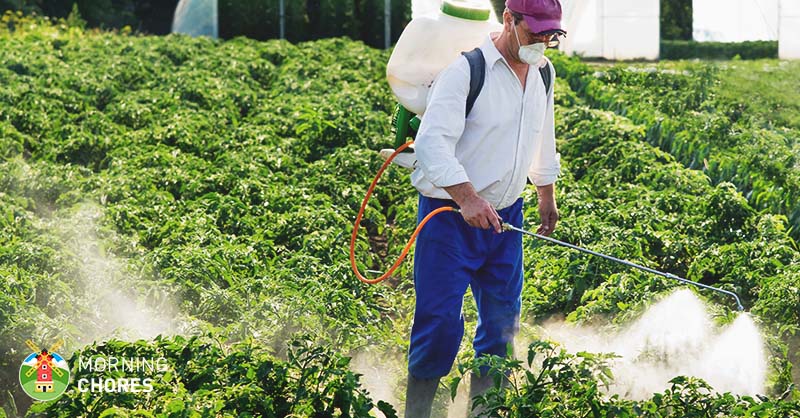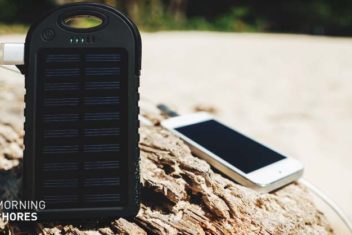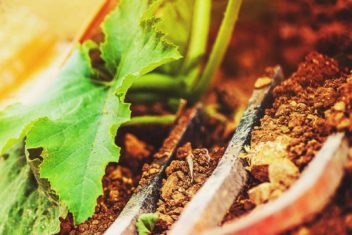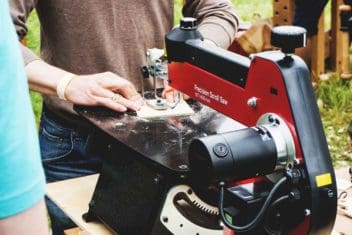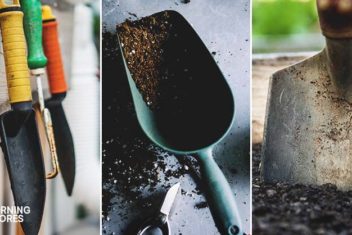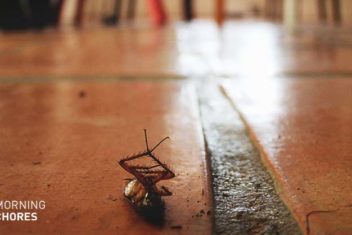If you want to have a flourishing garden, full of healthy vibrant plants, flying and crawling insects can be your worst enemy. It can be frustrating after you have planted and lovingly tended your plants, only to find them infested with creepy crawlies like caterpillars, aphids, and fruit flies that are happily munching their way through your garden or orchard.
This is where a good insecticide comes to the rescue. If you are an organic gardener who is concerned about toxic chemicals and would prefer an eco-friendly option, a botanical insecticide can act quickly to control and eliminate insects.
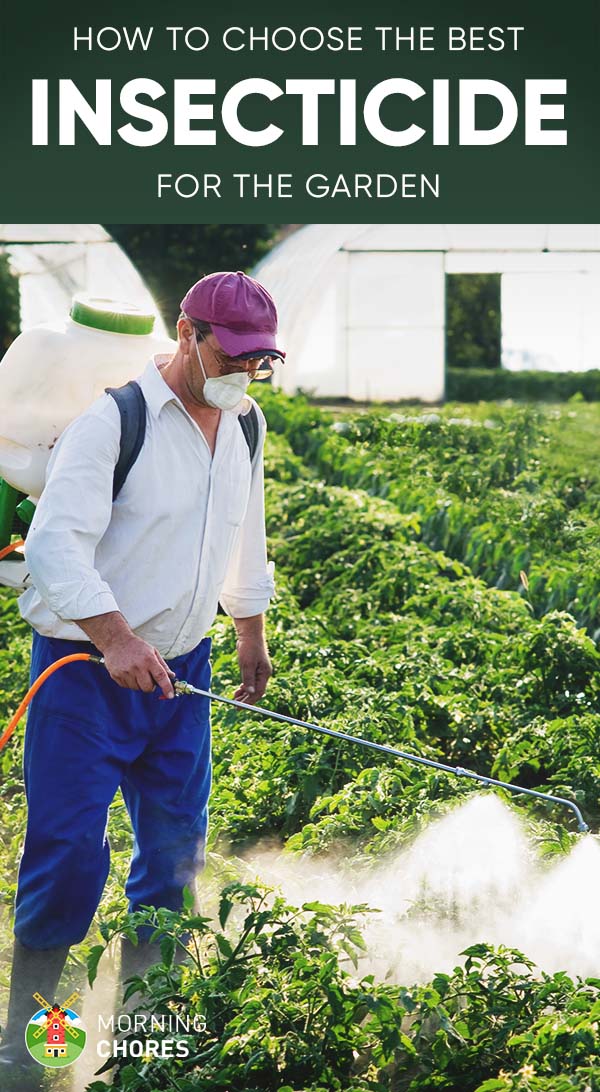
The 5 Best Insecticides
- Monterey LG6135 Garden Insect Spray
- Bonide (BND210) – All Seasons Horticultural and Dormant Spray Oil
- Southern Ag 10401 Natural Pyrethrin Concentrate (Our Top Pick)
- Garden Safe HG-93179 Neem Oil Extract Concentrate
- Natria 706240A Organic Plant Protection from Pests and Diseases Neem Oil Concentrate
Our Top Pick for the Best Insecticide
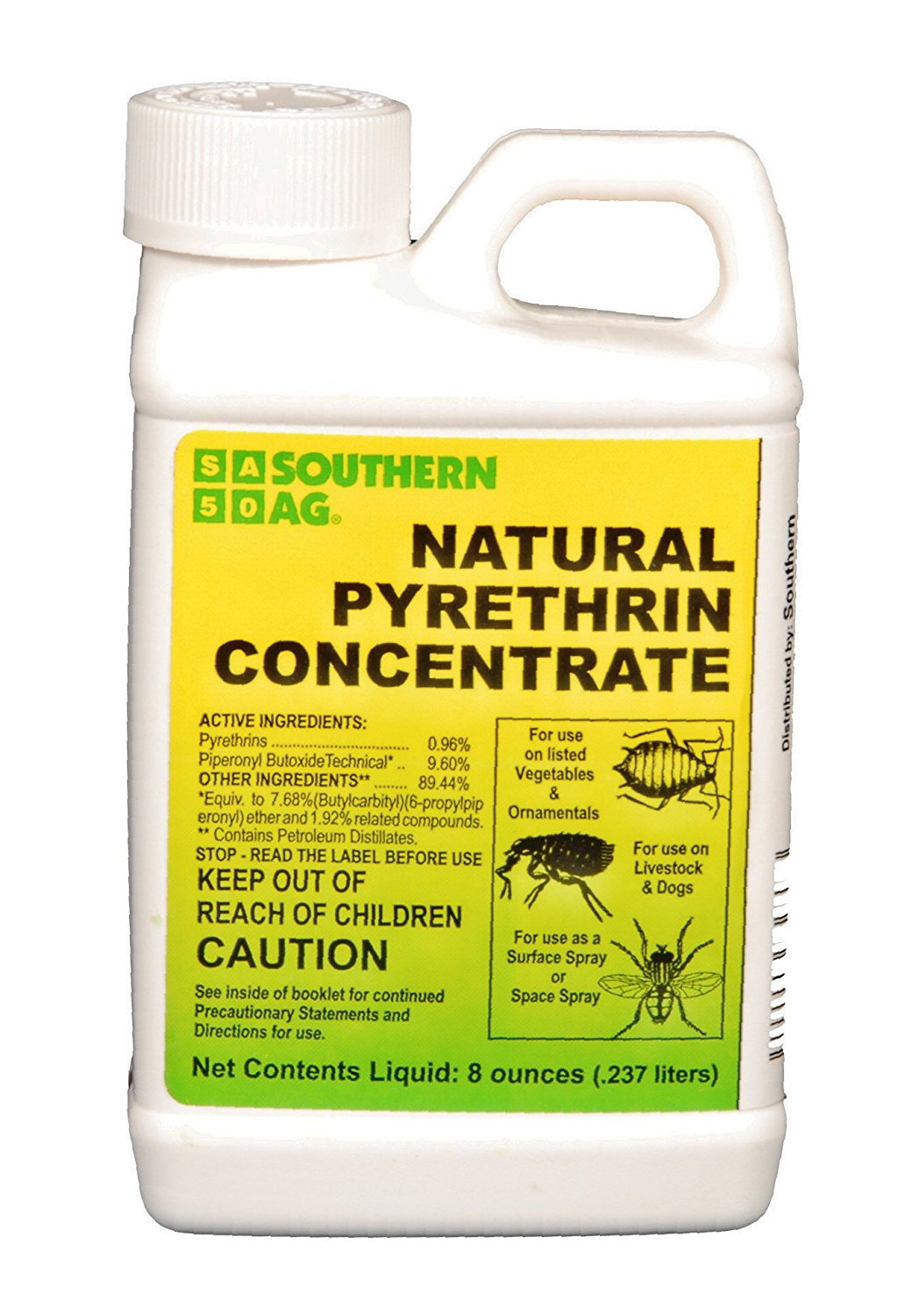
Our top pick for the best insecticide is the Southern Ag 10401 Natural Pyrethrin Concentrate.
As well as containing .96% Pyrethrin, which is very effective at controlling and eliminating a wide range of insects on fruit and vegetables, Southern Ag can be used for controlling pests on pets and livestock, as well as other pest infestations in and around your home. For an eco-friendly and natural alternative that is tough on pests, but kind to your plants, Southern Ag insecticide is the organic gardener’s choice.
Check the price on AmazonForms of Pest Control
Insecticides are used in commercial, domestic, urban, and rural environments. They come in three forms: Insecticides, Pesticides, and Herbicides. These three forms of pest control that stop insects and plant-based diseases can be used interchangeably. However, they have different uses.
Insecticides
Insecticides are a type of pesticide that is used to specifically target and kill insects. Some insecticides can include snail bait, ant killer, wasp killer, and insecticide sprays that target a wide range of insects. Insecticides are also very effective at controlling insects in the larval stage of development before they grow into adult insects. There are some insecticide brands that also work as a pesticide.
Pesticides
Pesticides are chemicals that are used to control, repel, and kill insects, plant diseases, snails, slugs, as well as weeds, fungus, and bacteria. These chemicals can work by ingestion, touch, or death, which can occur immediately or over a period of time. This depends on the product’s level of concentration and ratio of pesticide to water.
Herbicides
Herbicides are used to kill undesirable plants or “weeds”. Some herbicides will kill all the plants they touch. While others are designed to target one species.
Botanical Insecticides
While there are a lot of insecticides that contain strong chemicals that can effectively control and exterminate insects from gardens and crops, many organic gardeners want a more natural alternative that is non-toxic and eco-friendly.
Unlike synthetically based insecticides that can contain toxic chemicals, which can be harmful to humans, the land, and the environment, botanical insecticides contain naturally-occurring chemicals that are extracted from plants or minerals. While they are safe for humans, they are toxic to insects and plant diseases like “black spots” that can attack roses.
Naturally-occurring chemicals like Spinosad, Pyrethrin, and Neem Oil generally act quickly and degrade rapidly. They can be non-toxic to humans. Or have low levels of toxicity towards mammals and birds and have a minimal effect on the environment.
Some botanical insecticide manufacturers may use essential oils to repel insects like oil of cedar, lavender, eucalyptus, pennyroyal, citronella, rosemary, peppermint and soybean oil, which also work very well.
In your quest to find a natural alternative to nasty chemicals, some of the ultra-scientific names can be confusing. So here are some of the most common naturally-occurring chemicals that are used in many botanical insecticides.
Spinosad
Spinosad is a mixture of two chemicals namely Spinosyn A and Spinosyn B. It is a natural substance that is made from a soil bacterium that can be highly toxic to insects.
Spinosad has been registered for use in pesticides and insecticides by the US Environmental Protection Agency (EPA) since 1997. It controls a wide variety of pests like thrips, leafminers, spider mites, mosquitoes, ants, fruit flies, and other similar pests. Spinosad is a very versatile substance.
Besides being used in over 80 registered pesticide products for agricultural and ornamental plants, Spinosad is also found in some drugs regulated by the US Food and Drug Administration. In addition to this, Spinosad can also be used to control head lice on people and fleas on dogs and cats.
Spinosad is very effective at killing bugs. Once the insects come in contact with the insecticide, either through a granule, dust, or spray, it attacks their nervous system. This leads to paralysis and they usually die within only one-two days. A little gruesome perhaps, but this modus operandi is vital to the health of your plants.
Pyrethrin-Based Insecticides
Pyrethrin is extracted from the flowers of the pyrethrum chrysanthemum plant. It works effectively against a wide range of insects: ants, cockroaches, fleas, true bugs, aphids, scales, caterpillars, flies, and wasps, and beetles (especially Japanese Beetles).
It is ideal for organic gardening as it quickly disappears from the plants and soil after it has eliminated unwanted pests. With a low toxicity level, it is safe to use around humans, pets, and livestock. Pyrethrin works as a fast knock-down for insects as soon as they come in contact with it. However, they may revive if the dose you use is not high enough.
Insecticides that contain Pyrethrin will often be mixed with a low percentage of Piperonyl Butoxide (PBO), a toxic, non-organic chemical that makes the product more potent. Even though insecticides that use Pyrethrin only use a very small amount of Piperonyl Butoxide (PBO), you may prefer a product that uses all-natural products like Neem Oil or essential oils.
Neem oil
Neem oil is a naturally occurring pesticide that is found in the fruit and seeds of the Neem tree. Also, neem trees are native to India and other parts of Asia. They are known as the Margosa Tree in English and their botanical term is Azadirachta Indica. The oil is yellow to dark brown in color and has a bitter taste and a garlic/sulfur smell. As well as having high medicinal properties, it is also used in many skin and hair care products.
– Insecticides and Neem Oil
Neem oil is very effective at controlling pests and plant diseases. Neem oil is a mixture of components. Azadirachtin is its most active component and it repels and kills pests. It can also make it harder for insects to grow and lay eggs. Clarified Hydrophobic Neem Oil is the component that is leftover and it can also be used with Azadirachtin to control certain insects and pests, while some manufacturers may use hydrophobic neem oil with other ingredients.
Essential Plant Oils: Repellents and Insecticides
Essential oils are also used in many botanical insect repellents and insecticides. The most commonly used oils are oil of cedar, lavender, eucalyptus, pennyroyal, citronella, rosemary, peppermint, and soybean oil. They can work effectively to repel a wide range of insects that can attack our beloved plants and veggies, and pose minimal risk to people and pets.
5 Tips for Looking After Your Plants
- Before you start using the insecticide, pull out any weak or already infected plants away from the garden area. This is to stop the other healthier plants from getting infected or attracting pests.
- Build a healthy, organic soil foundation by using good, natural fertilizer, and compost. This will develop strong, vigorous plants. It will also help them to survive pests and diseases.
- Mix or rotate your plants. When plants are mixed, pests are less likely to spread throughout a crop. Rotating your crops can help you to avoid re-infestation of pests.
- Clear your garden area of any debris and weeds and use clean mulch. Overgrown areas in your garden are breeding places for insects.
- If you are working with plants that have already been infected by diseases, clean your tools before you move to work in another area of the garden. By keeping your tools clean you can reduce the rate of plant disease.
3 Safety Tips for Using Insecticides
- Before spraying your plants, wear long sleeves and pants and gloves. Also wear a face mask so that you do not inhale the fumes. Even if the product is organic, people with sensitive skin or breathing problems may be affected.
- Always read the instructions on the back of the product or in the manual if one is supplied. Use the insecticide as outlined by the manufacturer.
- If you come in contact with the insecticide, even though it is a naturally based insecticide, make sure you wash your hands with soap and water. If you develop a rash, stop using the product and check with your health professional.
5 Best Insecticide – Reviews
1. Monterey LG6135 Garden Insect Spray
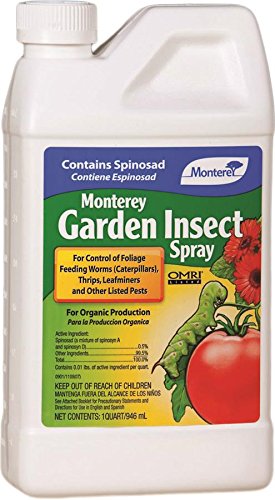
Monterey LG6135 Garden Insect Spray can be used on vegetables, fruit crops, ornamentals, and turf. It is very effective at controlling a wide range of pests like caterpillars, thrips, leafminers, codling moths, gypsy moths, borers, fruit flies, spider mites, and also beetles like the Colorado Beetle.
It is also very effective at eradicating fire ants in your lawn or other outdoor areas. Spinosad is the active ingredient in this fast-acting spray. It degrades quickly in the soil, and it is classified as an organic substance by the USDA National Organic Program (NOP). It is also OMRI Listed for use in organic production.
To get the best results, shake the bottle well before use. Follow the dilution ratio of insect spray to the recommended amount of water that is indicated on the product and mix thoroughly. Apply the spray uniformly to both upper and lower surfaces of plant foliage. It is recommended to mix only as much spray as needed for a single treatment.
In vegetable gardens, it is recommended that you do not use more than 3.0-gallons of spray for 1,000-square feet of area. You can use it as a spray, mixed with a wetting agent, or use as a soil drench.
It is designed to work within two days. However, if you do not see complete results, you may have to reapply a few times, but as it is a concentrated formula, only use the required amount for each application. Monterey Garden Spray is non-toxic and harmless to pets, children, and plants.
Pros
- Very good value for money
- Fast-acting on most insects
- Very effective
- Concentrated formula
- Biodegradable
- OMRI Listed
- Multi-functional
Cons
- Not effective on aphids
2. Bonide (BND210) – All Seasons Horticultural and Dormant Spray Oil
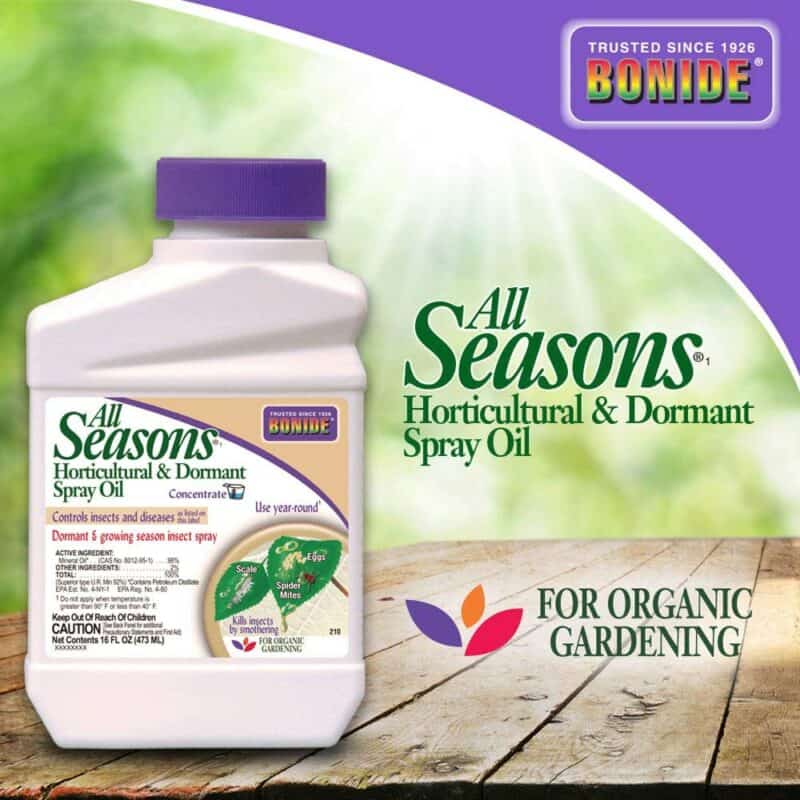
As well as killing those insects and mites that are intent on ravaging your plants, the Bonide All Seasons Horticultural and Dormant Spray Oil Insecticide contains a superior type of non-toxic paraffinic mineral oil which is safe to use around people and pets, and for organic gardening.
This versatile insecticide provides year-round protection against common insects including red spiders, aphids, scale insects, mites, mealybugs, whitefly, and certain species of moth. You can spray it on plants at any time during the growing season – the dormant stage, green tip stage, as well as the delayed dormant stage. It also works as a disease control agent against powdery mildew, rust, greasy spot, botrytis, and other listed diseases.
Bonide works effectively on a wide range of flowering plants like roses, flowering shrubs, vegetable plants, herbs, indoor ornamentals, fruit trees, as well as other crops listed on the label. As well as protecting your garden, the insecticide can also be used for greenhouse plants.
All Seasons spray oil is a very economical product. You only have to add a few tablespoons from the 16-ounce bottle to a gallon of water. So depending on your gardening setup, it will last quite a few seasons. This insecticide is highly concentrated. So make sure you follow the instructions carefully, as you can damage vegetation.
Pros
- Protects against diseases
- Superior paraffinic mineral oil is non-toxic
- Safe to use around people and pets, and organic gardening
- Highly concentrated insecticide
- Very effective on most insects and mites
- Can use year-round on a wide range of plants
Cons
- Using too much insecticide can burn vegetation
- Some complaints about the bottle’s seal being broken
3. Southern Ag 10401 Natural Pyrethrin Concentrate

Southern Ag Natural Pyrethrin Concentrate is a highly versatile insecticide. You can use the concentrate to control a wide range of insects, either in your garden or in and around your property.
It is the ideal choice for people who want a fast-acting and naturally-occurring, botanical insecticide. The primary active ingredient is 96% Pyrethrin, which is safe for humans and animals. However, deadly to plant-eating insects.
Southern Ag concentrate is a very versatile product. You can use it with a garden sprayer for the garden or orchard, in a greenhouse, as well as ornamentals. It works very quickly, usually within an hour of application. It can kill aphids, whiteflies, beetles, and worms. You can use Southern Ag as a pesticide to control fleas, mites, lice, flies, gnats, and mosquitoes on your pets. And you can also it as a dip for livestock.
It also works effectively as a surface or space spray around your home to kill flies, ants, roaches, silverfish, spiders, mosquitoes, and yellow jacket wasps.
Before you apply the spray, make sure you read the included booklet, especially if you are going to use the product for controlling pests on your pets.
Pros
- Made from naturally-occurring Pyrethrin
- Very good product
- Non-toxic
- Eco-friendly
- Concentrated formula
- Versatile: ideal for plants, pets, and livestock
- Can also be used outdoors and indoors
Cons
- Not ideal for use on beetles
- Small bottle
- Not ideal as a flea dip on dogs
4. Garden Safe HG-93179 Neem Oil Extract Concentrate
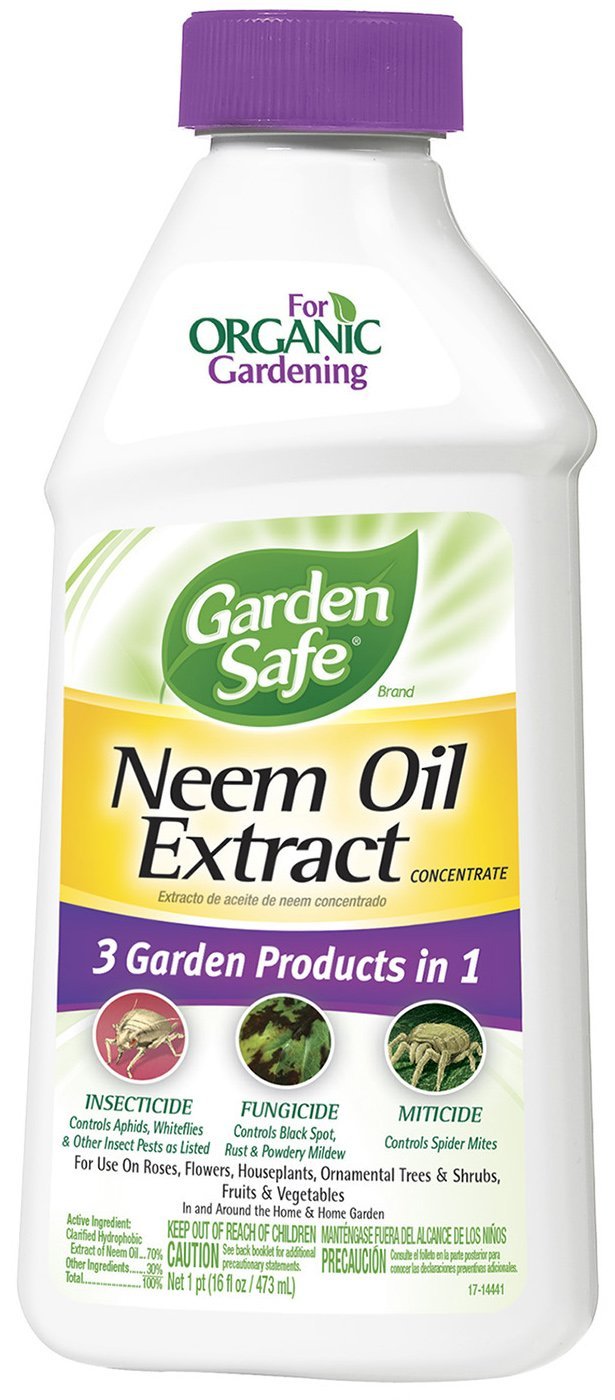
Garden Safe uses the naturally occurring pesticide Neem Oil to effectively eradicate pests that seek to feed on your flowers, fruit trees, and vegetables. With three pest exterminating products in one bottle, your plants are safe from insects, pests, and diseases.
Garden Safe contains 70% Clarified Hydrophobic Extract of Neem Oil and 30% of other ingredients. It works as an insecticide, fungicide, and miticide. It can also control insects and pests like Japanese Beetles, Whiteflies, Aphids, Caterpillars, Mealybugs, Fruit Flies, Midges, Budworms, and Spider Mites, as well as killing the eggs and larvae of adult insects. Garden Safe can also protect your roses, flowers, fruits, vegetables, ornamental trees, and shrubs from black spot, rust and powdery mildew in 24 hours.
You can use the botanical insecticide in and around your home and garden right up to the day of harvest. You can use the product as a dormant or delayed dormant spray to control overwintering eggs of various insects on fruit and shade trees, shrubs, roses, and other ornamentals and vegetables. In addition, you can also use it as a leaf polish on hardy plants.
For the best results, shake the bottle well before using the product and mix it with warm water. Do not apply to wilted or sick plants, or to newly transplanted cuttings or seedlings. Do not apply Garden Safe to sensitive plant species such as fuchsia flowers, hibiscus flowers, some rose flowers, ornamental olive trees, or some carnation varieties without testing the product first. If in doubt read the back of the bottle or contact the manufacturer.
As this product is oil-based and can cause leaf burn, take care when spraying. Choosing to spray either in the early morning or late evening.
Pros
- Affordable
- Very effective
- Can control and eliminate a wide range of insects
- Ideal for organic gardening
- Contains a high level of Neem Oil
- Three garden products in one bottle: insecticide, fungicide, miticide.
Cons
- Strong odor
- Can burn plants
5. Natria 706240A Organic Plant Protection from Pests and Diseases Neem Oil Concentrate
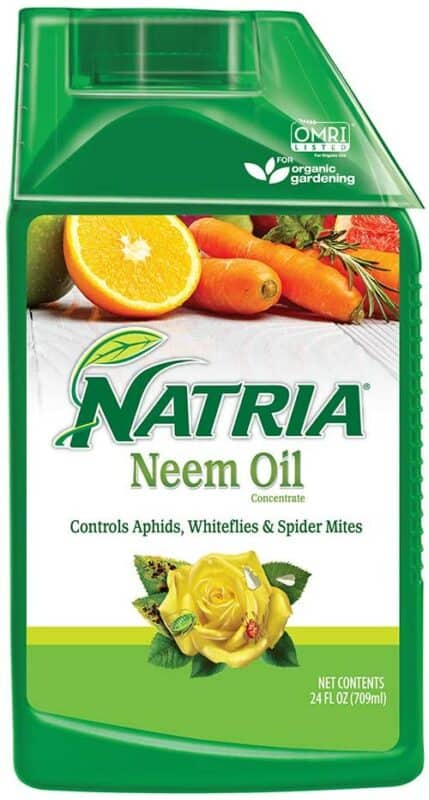
If your roses, orchids, fruit trees or tomato plants are under attack by flying and crawling insects and suffer from diseases like black spot and mildew, Natria Neem Oil Concentrate will effectively kill and destroy these nasties and bring your plants back to life.
NATRIA uses Clarified Hydrophobic Extract of Neem Oil in a powerful concentrate. Making this insecticide the ideal choice for organic gardeners who want a product that is eco-friendly and non-toxic. However, it is lethal to pests.
Just mix 2-ounces of Natria with 1-gallon of room temperature water into a spray bottle. Within a few days your roses will bloom, veggies will thrive, and fruit trees will spring back to life. This insecticide contains a concentrated formula so a little goes a long way. You can use the spray right up until the day of harvest.
Pros
- Very good value for money
- Ideal for organic gardeners: non-toxic and eco-friendly
- Works as an insecticide and fungicide
- Good insect and disease control
- Can be used on orchids
Cons
- Slow working on roses
- Not 100% Neem Oil
Our Top Pick for the Best Insecticide

Our top pick for the best insecticide is the Southern Ag 10401 Natural Pyrethrin Concentrate.
As well as containing .96% Pyrethrin, which is very effective at controlling and eliminating a wide range of insects on fruit and vegetables, Southern Ag can be used for controlling pests on pets and livestock, as well as other pest infestations in and around your home. For an eco-friendly and natural alternative that is tough on pests, but kind to your plants, Southern Ag insecticide is the organic gardener’s choice.
Check the price on Amazon